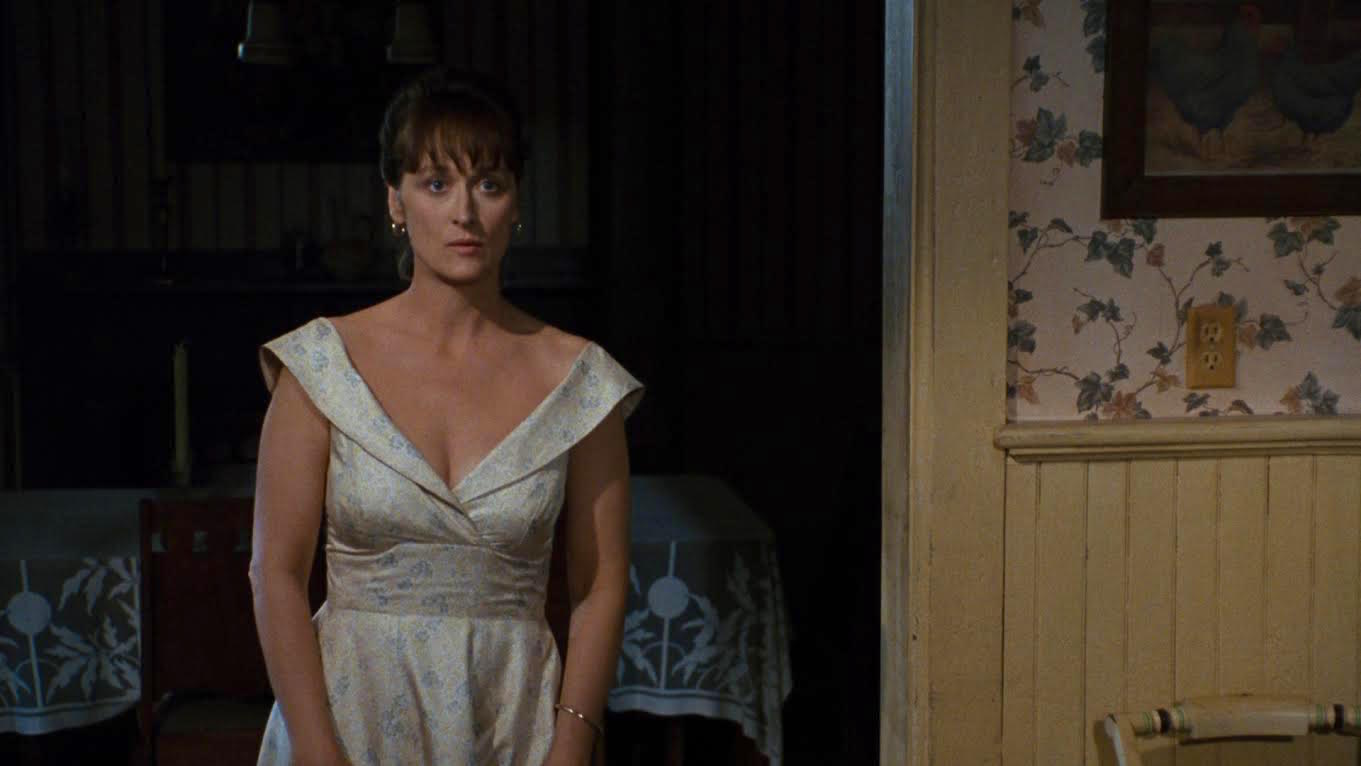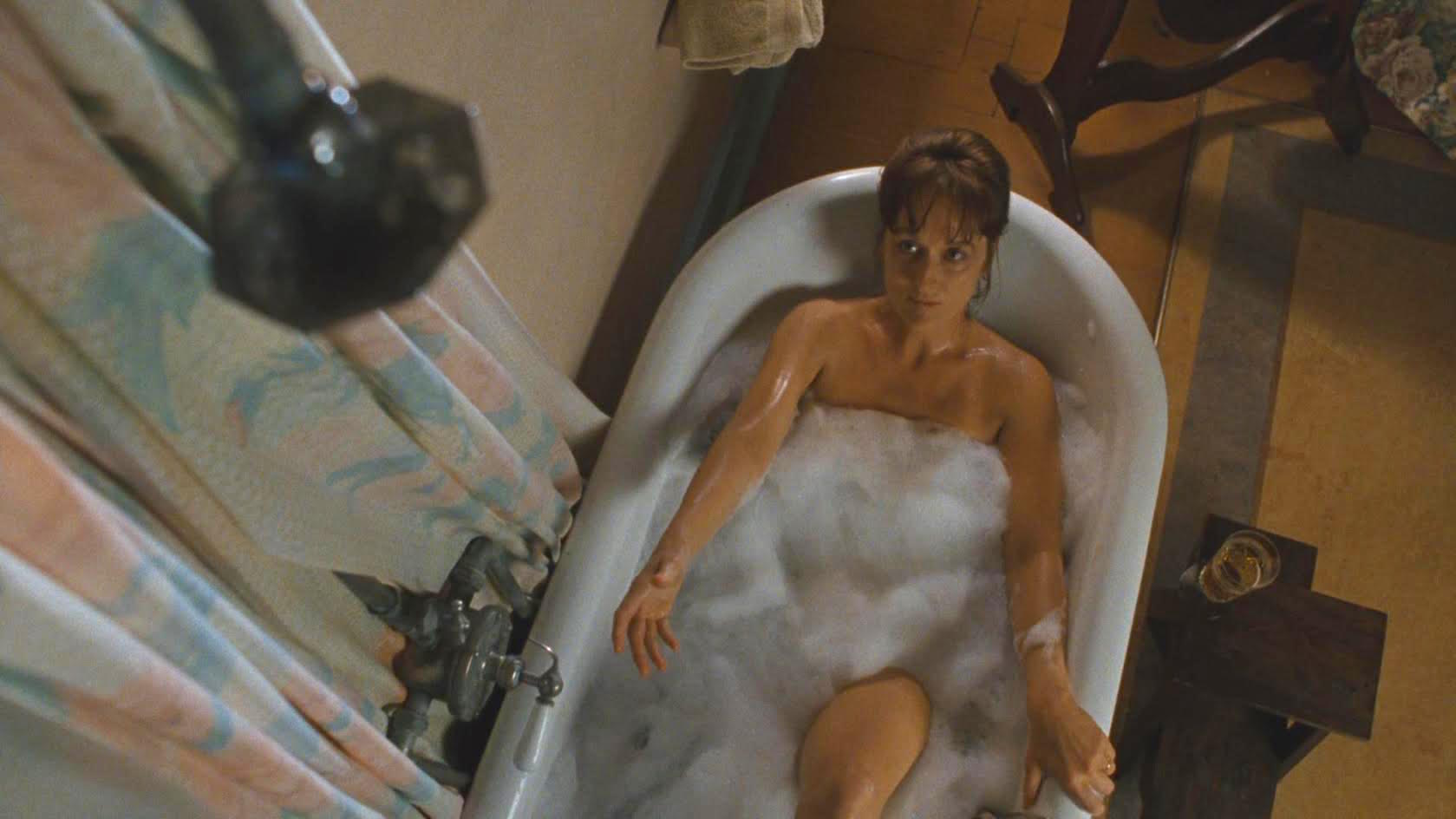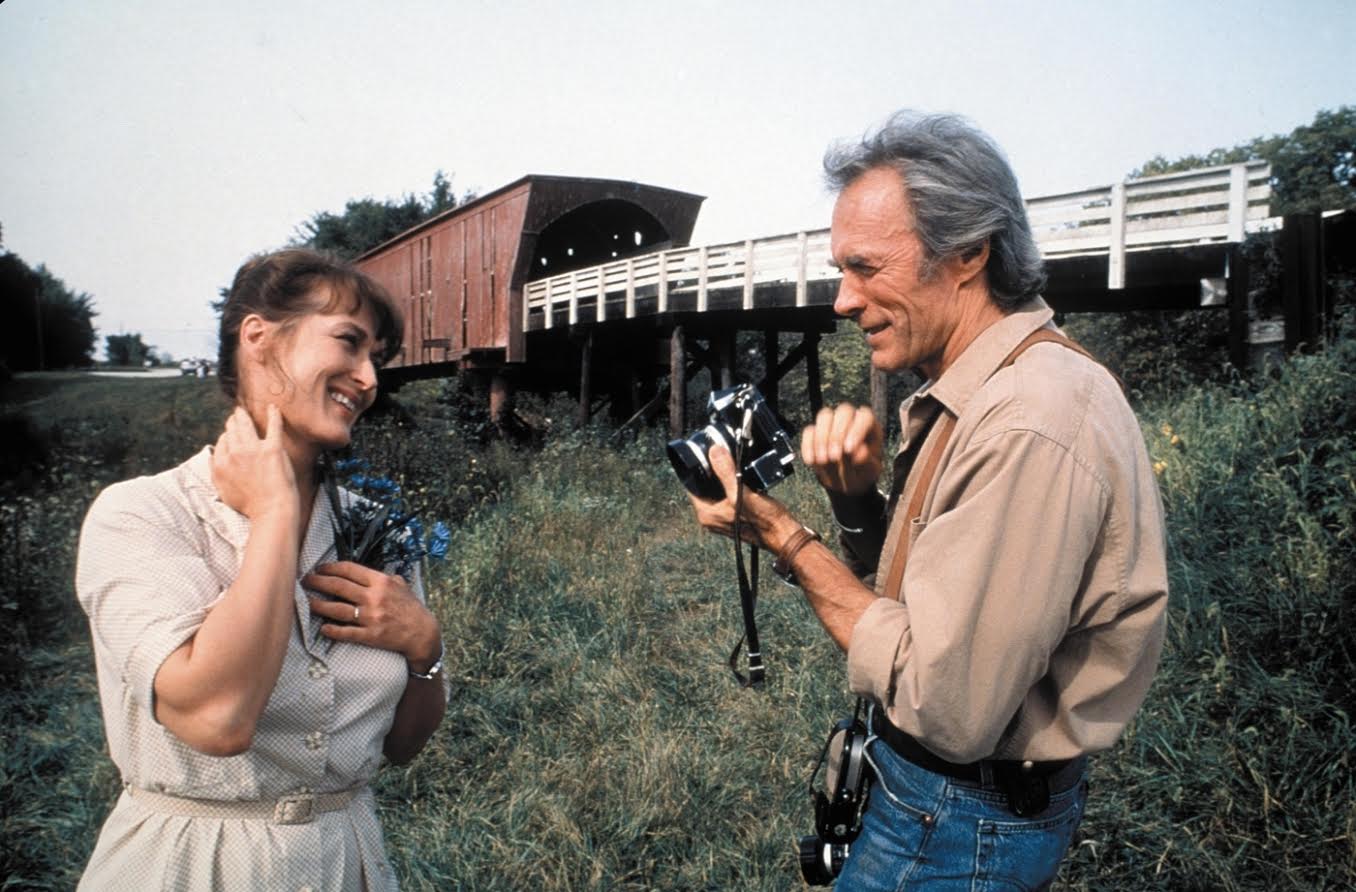John and Matthew are watching every single live-action film starring Meryl Streep.

#22 — Francesca Johnson, an Italian war bride-turned-American housewife who falls in love with a visiting photographer.
JOHN: Francesca Johnson (Meryl Streep) is sipping a beer in a bathtub while a charming stranger waits for her to eat dinner downstairs. Francesca’s husband and two children have left for a trip to the Iowa state fair, but her few days of solitude have been quickly interrupted by the welcome arrival of Clint Eastwood’s Robert Kincaid, a travelling National Geographic photographer on assignment to shoot Madison’s quaint covered bridges. With her brunette bangs and stray wisps of hair dangling out from her updo, Streep lounges in the bath, watching the water from the shower head above drip down into her hands. Robert has just showered, and, in voiceover, Francesca relates the eroticism of the moment, their sharing the bathtub only minutes apart. Streep’s face has never looked more assured and aroused, even as she’s unsettled by the seismic consequences of this romance. The simultaneous thrill and troubling implications of the moment flicker on Streep’s face as she loses herself in thought, already foreseeing the end of this brief encounter while testing the boundaries between her desires and responsibilities.
In this scene, the magnificence of Streep’s performance elevates this admittedly soapy and conventional tale into the pantheon, a brilliant fusion of Francesca’s subjectivity given weight by a generous filmmaker and imbued with soul-shaking truth by a master performer...

The Bridges of Madison County arrived at a perfect moment for both this series and, more importantly, Streep’s career.
After slogging through early-90s Streep fare ranging from the trivial (The River Wild, Defending Your Life) to the outright appalling (The House of the Spirits), Bridges is like the delicious dessert that rewards a tough diet. At 45, Streep’s age-appropriate casting as Francesca initially troubled studio executives, who wanted younger actresses, but nevertheless, Streep had always been Eastwood’s first choice, and she accepted the role almost immediately via telephone. Robert James Waller’s novel had already been a bestseller when the film premiered in the summer of 1995, ensuring the adaptation’s success at the box office. After a five-year dry spell, Streep scored her tenth Oscar nomination for her efforts. With this mid-career reinvention, and her subsequent return to Connecticut after shooting The River Wild, Streep doubled down on the facets of her persona that other middle-aged actresses might abandon and revealed a level of onscreen honesty that she had yet to reveal before.
As Francesca Johnson, Streep gives one of, if not the, most achingly honest, startlingly direct, casually dexterous, unfussy, lived-in, and luminous performances of her career. Words are pithy objects when describing the virtuosic way Streep stares at Eastwood from across her kitchen table during dinner, reluctantly poses for his photographs on the bridges, secretly watches him as he bathes, and, finally, clenches and releases the handle of a car door, resigning herself to domestic sorrow. It’s a performance full of such wonders from scene to scene, so why don’t you share some of your favorite moments in Streep’s performance?

MATTHEW: The Bridges of Madison County is one of the exceedingly rare films in which I forget Streep the Legend and see only the character at hand. Francesca Johnson is the Streep creation I hold closest to my heart for reasons that are largely ineffable but no less palpable. Is it because Francesca, the solid, often-overlooked center of a family who needs but frequently doesn’t see her, could be any number of the women, living and departed, who are the cornerstones of my Italian-American clan? Or maybe it’s because Francesca is, at the outset of Bridges, a person who has closed herself to the unexpected, especially when it comes to passion, and could therefore be anyone who has ever sacrificed her spirit and resigned herself to a life more mundane than the one she had long ago imagined.
“Bari” is the key that first unlocks Francesca’s guarded heart. She is riding shotgun in Robert Kincaid’s truck, voluntarily guiding this journeyman photographer to the bridges he has been assigned to shoot. Francesca’s stony looks and curt, conversation-ending answers are just a couple of the many formidable guards that she throws up in the face of this stranger’s interest and arousal, which she can clearly detect but firmly chooses to divert. But then Robert asks where Francesca hail from, to which she answers, “Small town on the Eastern side no one’s ever heard of called Bari.” “Oh yeah, Bari,” Robert replies, “I’ve been there.” The coy but clear-cut smile that unfolds on Streep’s face at this sign of recognition is one of surprise but also furtive delight. For Francesca, this whistle-stop region is a point of connection to this rugged newcomer but also something like a shared secret. “No, really?” Francesca asks, and her voice is loose and intrigued, eager to deepen the bond that will imminently unravel life as she once knew it.
 Meryl and Clint on set
Meryl and Clint on set
Streep’s ability to convey all of this with a smile and a handful of syllables is, like so much else in this peak performance, an extraordinary application of her physical and vocal capacities, which transform this effort into so much more than a voluptuous Magnani riff and are used here to chart every breathtaking crescendo and heartsore diminuendo in this romance for the ages. Eastwood shot Bridges in-sequence and the typically unfussy economy of his filmmaking both makes and enhances Streep’s performance. At this stage in his career, Eastwood was a director wise and inconspicuous enough to often just train his camera on Streep, as in Francesca and Robert’s final candlelit dinner, and simply let the master free to do her work and outline her own path to the crux of a scene. Streep provides, in return, the most attentive and unpredictable scene partner with whom Eastwood has ever shared the screen. He becomes practically boyish under her gaze, as when Robert describing a line of his writing that he thinks might resonate with Francesca, who responds with kind consideration to his earnest eagerness but renders him bashful with her perplexity. (Has Eastwood ever blushed in any other frame of film outside of this?)
Streep’s thrumming and ever-occupied presence has rarely been more of an asset to a film, her voice and body serving as malleable, married instruments through which the actress can play Francesca not as a bodice-ripping heroine but as an everyday woman who is at last realizing the full extent of her yearning for something more. So many moments in Bridges highlight this inner discovery and the romantic turmoil that coincides with it, a journey plotted through the genius touches of Streep’s outward-facing characterization: using Francesca’s uncertainty of her English to undercut the emotional invulnerability she attempts to project towards Robert; wavering on her tepid description of husband Richard’s spousal merits; employing a blink-and-you-miss-it flinch when Eastwood asks if she wants to leave her husband in order to bring Francesca’s guilt into focus. She shades each scene with a panoply of moods, emotions, and motivations. But the throwaway gestures are just as vivid and indelible, from the self-conscious pat Francesca gives her behind as Robert sits waiting in her driveway to her roaring, full-throated, leg-kicking laughter to the way she claps her hands in hurried triumph after Robert confirms their self-fulfilling second dinner date over the phone. What else stands out for you about Streep’s Francesca?

JOHN: I often forget that Francesca Johnson is a fictional character and not an actual human being. Streep’s performance is so naturalistic that watching her act almost resembles live theater, where the only distance between audience and a flesh-and-blood actor is just a few yards and some willful suspension of disbelief. What strikes me most about Streep’s expert performance is the uninhibited agency she allows Francesca to experience, even in moments where we’re meant to perceive her as a stalled and dormant woman waiting for an event to shake her slumber. In her first scenes, Streep watches her family eat dinner through bored and disappointed eyes. Later, when Eastwood first drives up to her porch, there’s a game and alert essence palpable behind Francesca’s cautious and guarded first impulses. Robert didn’t catalyze Francesca’s desires and frustrations, as Streep shows us early on, but instead loosened the faucet of her pent-up pleasure. Streep is constantly thinking and desiring, a combination she is rarely afforded onscreen in such meaty material, but an especially rare feat considering that Francesca is just an “ordinary,” middle-aged housewife, a type usually passive, misconstrued, and sold short in American movies.
Bridges also contains, to my mind, a top-tier Streep accent, clearly representing an Italian-born woman who has gradually adjusted to the cadences of English. Subtle though undoubtedly studied, Streep’s Italian accent is in perfect sync with her exterior and becomes an asset, rather than a distraction, in bringing Francesca to life.

Streep has spoken about how her childhood memories of an Italian warbride she once knew while growing up in New Jersey helped her to shape Francesca. She describes that woman as an exotic creature married to a blonde GI, who brought her back to America after the war, just as Francesca’s backstory makes clear. Streep says, “I loved the way she talked and moved and spoke, so I basically copied her.” This European sensibility coalesces well with Francesca’s understanding of the often punishing realities of American life, especially in small towns peppered across the Midwest, where rumors and scandals swiftly create outcasts destined for bad service at the local dinner, to cite one mid-film scene that occurs outside Francesca’s purview. Consider how Francesca instantaneously entertains a neighbor who barges in with dessert, stealing precious time from her and Robert, or the careful way she lies about buying herself a new dress in town. This caution roots Francesca squarely in her stifling milieu and sets up her final decision to remain in Madison.
Are you ready to talk about — takes a deep breath — the door handle?


MATTHEW: Do I ever talk about anything else?
Bridges remains the rare movie romance that actually seems to beat with a burning and abiding passion shared between two people. And like so many great romances, everything must build up to an inevitable moment of departure. One night, midway through their fleeting encounter, Robert takes Francesca to a predominantly-black roadside jazz club for a romantic evening of drink and dance that is interrupted when Robert drudges up what Francesca has so far managed to avoid: their impending separation. She has tried so hard to forget, but now it is here. Streep’s eyes cloud over and lose their concentration, but still the pair continue swaying.
“We are the choices that we have made,” Francesca tells Robert near the end of their affair, her voice anguished but certain, breathing fresh air into Robert James Waller’s cornball clichés with the hard-earned wisdom of lived experience. Francesca doesn’t open the car door and join Robert in a life of ardor and adventure, which may be a failure of courage and nerve but not a failure of reason. Is it really any wonder that a number of Streep’s performances climax in the act of choosing? From Sophie’s Choice to Falling in Love to The Post to Francesca holding the key to her future in the palm of her hand and then slowly, sadly letting her love drive away, no other screen performer has ever confounded the border between audience and actor as completely as Streep. For me, this will always be the definitive Meryl choice. And sure, in this scene, she’s aided by her own superfluous but no less sorrowful voiceover and Lennie Niehaus’ soaring score, but the scene — and really the movie — lives or dies by what Streep does in the moment.

Take another scene, the fireside dialogue that follows the couple’s first time going to bed, in which Francesca begs Robert to detail a bakery they both know in Bari. The memory fills Francesca’s head with reminiscences and her eyes flood with tears, even though, at the same time, she admits to forgetting herself, turning her body and soul over with erotic abandon. This scene, while poignantly and sparsely scripted by Richard LaGravenese, really only requires Streep’s face to achieve its desired potency. In this scene, the crystal clarity of Streep’s visage fully embeds us within the headspace of her character as the actress strips herself bare so that the emotions and thought-processes are forever foregrounded and thus completely legible. In doing so, we are able to reside inside the same feelings as Francesca, not only in this scene but at every stage of her relationship with Robert.
“That’s why I go to the movies, to feel what other people feel,” Streep has previously said about The Bridges of Madison County. Such is the magic of Meryl Streep, who has been called on time and time again to allow us lucky viewers to understand the inner workings of a complicated heart and the difficult decisions that can determine the path our lives may take. If her performances are all working towards a single truth, it may very well be that a life devoid of difficult decisions and personal stakes is a life unlived and unfulfilled. Or, maybe it’s that, to paraphrase a line from another gloriously thwarted cinematic romance, the problems of two people — or even just a single person — do indeed amount to so much more than a hill of beans, both in the all-seeing eye of a camera and in the rapt eye of a viewer. As Francesca grapples with the handle of her husband’s truck, reckoning with the life she must live and the love she must forfeit, Streep proves yet again that there is no greater form of transportation in the movies than an actor’s miraculous ability to place us under the skin and inside the soul of another human being.

Catch up with 'Months of Meryl' why don't you?
- Julia (1977)
- The Deer Hunter (1978)
- Manhattan (1979)
- The Seduction of Joe Tynan (1979)
- Kramer vs Kramer (1979)
- The French Lieutenant's Woman (1981)
- Still of the Night (1982)
- Sophie's Choice (1982)
- Silkwood (1983)
- Falling in Love (1984)
- Plenty (1985)
- Out of Africa (1985)
- Heartburn (1986)
- Ironweed (1987)
- A Cry in the Dark (1988)
- She-Devil (1989)
- Postcards from the Edge (1990)
- Defending Your Life (1991)
- Death Becomes Her (1992)
- The House of the Spirits (1993)
- The River Wild (1994)